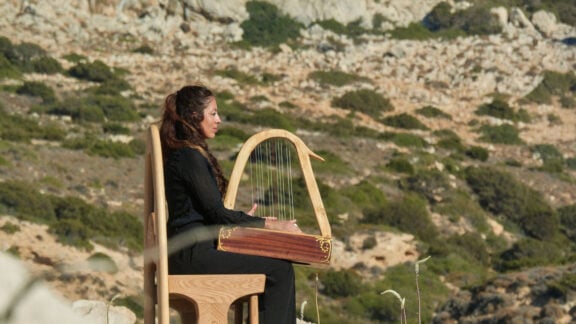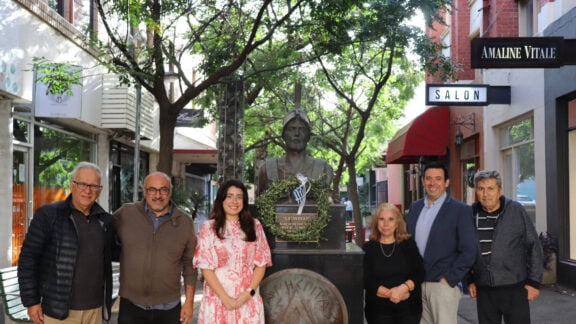Barrister Michael Pearce, German Honorary Consul-General for Victoria, says that the Greek diaspora is such an exemplary model that Victorians of German ancestry should learn from their experience.
Mr Pearce took up the role of Consul nine months ago and has put his mark on the job, suggesting it’s high time for a re-evaluation of how Victorians of German descent can explore new ways to celebrate their cultural identity.
The Melbourne barrister with a lifelong interest in German affairs says that Greek Australians have utilised their cultural traditions to become one of Victoria’s great success stories, and that those of German heritage can follow suit.
Understandably says Pearce, during and after the Great War and WWII, the first generations of migrants to Australia from Germany often changed their names and shied away from their identity.
Later their offspring continued to distance themselves from their Germanic heritage, or depending how you look at it, integrated completely into Anglo-Australian society.
“After WWII, a German living in Australia would not draw attention to the fact that he was German. Sadly, a lot of that heritage has been lost,” says Pearce.
With seven per cent of South Australia’s population identifying itself of German heritage, the figure for Victoria is lower, with successive generations severing their ties to their ancestral identity, whether consciously or unconsciously.
“The German community hasn’t been a visible community,” says the consul. “Victorians haven’t gone out of their way to identify as Germans, but the reasons for that are starting to recede into the past.”
Mr Pearce points to two remarkable Victorians – one from the past and another from the present – to support the argument for there being much to celebrate in the largely “invisible” Victorian German story.
Ferdinand von Mueller, who arrived in Australia from Bremen in 1847 and was appointed the first Director of Melbourne’s Royal Botanic Gardens ten years later.
Mueller’s many achievements included pioneering research into Victoria’s natural history.
He was one of the first people to explore much of Victoria and was the state’s first Government Botanist, establishing the National Herbarium of Victoria, Australia’s most important collection of preserved Australian native plants.
More than 150 years later, Pearce describes Jeff Connolly, CEO of Siemens Australia as a towering example of a Melburnian whose achievements in the world of trade between the state, Germany and China are immense. Trade relations are part and parcel of Germany’s deeply-layered connection to Victoria and capital can and is being made from that relationship, says Pearce, adding that
the “triangle of interest” of trade between the three countries is key to sustaining Australia’s healthy trade relationships.
“Australia supplies the raw products, Germany supplies the technology and China then puts it all together.
“We think we’re going gangbusters with our trade with China, but the Germans have been there long before us.”
With Germany as the strongest economy in the European Union supporting its powerful position in the EU, any discussion of Germany inevitably involves its role in supporting the Troika’s position on Greece.
Its perceived role as enforcer of austerity conditions for Greece’s bailout as the European debt crisis deepened is for many Greeks the source of huge resentment.
Melbourne’s Honorary Consul to Germany admits that such a sentiment is understandable.
“People have been suffering in Greece with the austerity measures being implemented,” says Pearce, “but I won’t pass judgment on whether they’re necessary, whether they go too far, or whose fault they are.
“When people suffer like that they naturally look for people to blame. It’s easy to see why people think Germany as the main power is imposing these conditions on it, but it’s a little more complicated than that.”
70 years after Greece was occupied by Germany under Nazi rule, for some, the wounds still run deep. Some have even suggested war reparations should be exacted from Germany for its actions during the occupation.
As a legal expert, the consul-general is perhaps more qualified than most to comment on such calls.
“Since the reunification of Germany every detail about WWII has been concluded. Reunification closed the book on everything,” he says.
“The Soviet Union extracted a large amount of reparations out of East Germany because they were in control and took what they wanted – apart from that, no reparations were imposed on Germany by the victorious powers.
“They realised what damage had been done by reparations after WWI. One of the factors in the rise of Naziism, most historians agree, were those reparations.”
With Germany’s 20th century legacy – as global aggressor and cradle of Nazism – receding into the distant past, perhaps it’s only seventy years later, two generations on, that Australians of German descent can feel truly confident in reclaiming their cultural identity.
“Germans deserve some credit for the frankness and the candour with which they’ve owned up to that past. There’s been no attempt to sweep it under the carpet,” he says.
Michael Pearce’s quiet quest to encourage another Victorian migrant community to rediscover their roots is to be applauded.
That he chooses the Greek experience as a model, above all others, is testament to the achievements of the Hellenic diaspora, but also to the power of social healing between communities across the generations.







